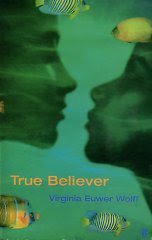
I recently read Beth Kephart's first young adult novel
Undercover. It is a story about a young high school girl, Elisa. She is gifted poetically, a talent that boys notice and use to their advantage. Elisa writes notes for them to use in courting the girl of their choice. (I found it interesting that there was no mention of payment for these poetic love notes. Are we supposed to believe that Elisa helped all these lovesick boys for free?) Along the way she falls for a boy that she is helping. She spends the winter pining after this boy, teaching herself to ice skate, observing nature, and lamenting her parents' failing marriage.
As I have seen mentioned on other blogs, and I will post it as well: do not read the inside jacket summary. It gives away too much of the story.
This book contains a beautiful passage that I will share with you:
And he said that there were two kinds of chances you take in life, and that I had chosen one. You can love not enough, he said, or you can love too much, and when you love too much, you risk everything, but you also enter into a thing called beauty. (Kephart, Beth.
Undercover. New York: HarperTeen, 2007.)
This passage struck me personally, and I am thankful for it.
However, the book as a whole let me down. It was too melancholy for my taste. Elisa has no friends, her parent's marriage is failing, her sister doesn't acknowledge her at school, her mom is distanced, etc. etc. Maybe it's because I just read
Thirteen Reasons Why, but I thought, This girl could be suicidal. But don't worry, she's not!
I was disappointed to see Elisa judge her classmate on his large nose. She really dislikes this boy because of his large nose and obnoxious behavior. Maybe she should wonder if he is using his behavior to distract from his nose. Like Cyrano de Bergerac used humor to distract from his large nose (an important part of the story). Also, Elisa has a deformed earlobe that she is embarrassed of and hides under her hair. Her classmate can't hide his nose as easily, so why is she so hypocritical?
I have written a novel, I see. Here is one last thought about the book's content. I was disappointed at the use and heavy implication of Mary Oliver's poem "Wild Geese." The author (and hence Elisa's teacher who gives it to Elisa) advises the reader to forget religion and become like an animal to be able to fully engage in and enjoy life.





















